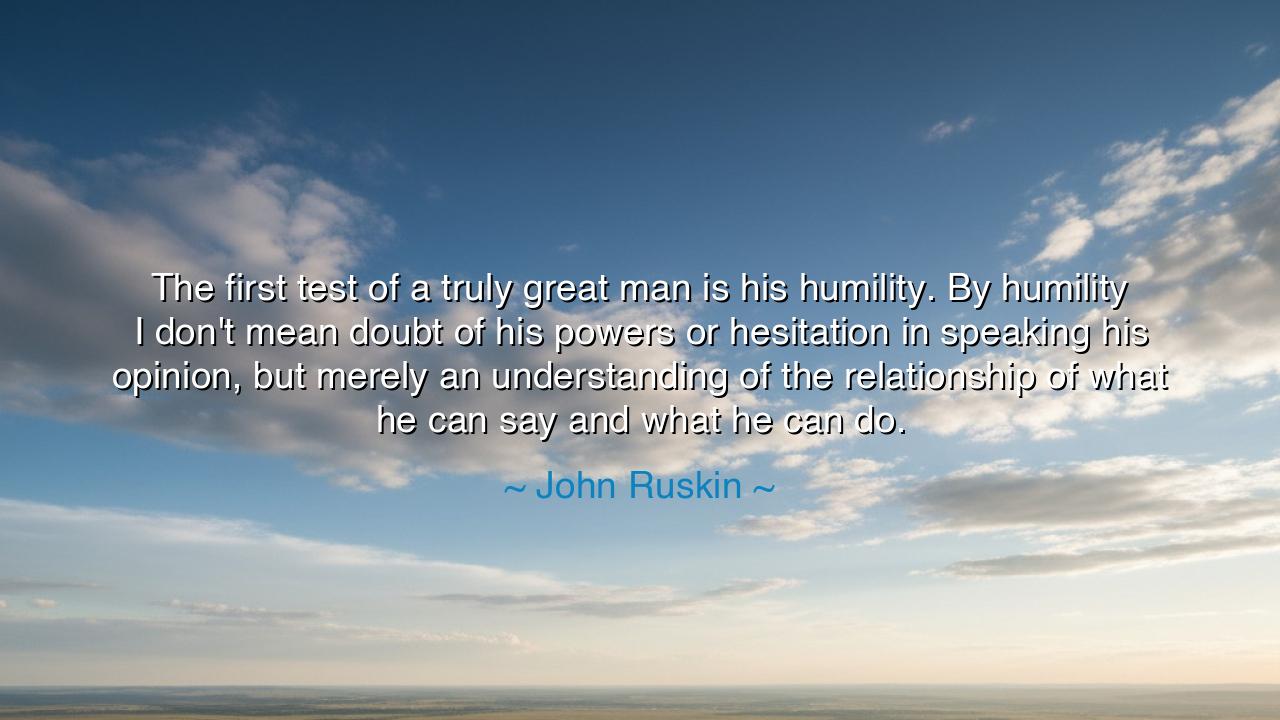
The first test of a truly great man is his humility. By humility
The first test of a truly great man is his humility. By humility I don't mean doubt of his powers or hesitation in speaking his opinion, but merely an understanding of the relationship of what he can say and what he can do.






The words “The first test of a truly great man is his humility. By humility I don’t mean doubt of his powers or hesitation in speaking his opinion, but merely an understanding of the relationship of what he can say and what he can do,” spoken by John Ruskin, carry the weight of an ancient truth — a truth as enduring as the mountains he so loved to write about. In this reflection, Ruskin reveals that greatness is not measured by strength or speech, nor by the grandeur of ambition, but by the quiet wisdom that knows its own limits. Humility, to him, is not weakness, but balance — the sacred equilibrium between power and purpose, between word and deed. It is the mark of those who have conquered not the world, but themselves.
To be humble, in Ruskin’s sense, is to possess mastery over one’s ego. The humble man does not shrink from his abilities, nor does he deny them. He knows his power, but he knows it in relation to something greater than himself — to truth, to justice, to the divine order of the world. The proud man speaks loudly of what he will do; the humble man quietly fulfills it. The proud man seeks recognition; the humble man seeks rightness. Thus, humility is not the denial of power — it is its discipline, the art of directing strength with wisdom and grace. It is the understanding that to have the ability to act does not mean one must act for glory, but for good.
Ruskin, a philosopher of both art and morality, lived in an age when progress dazzled the world — yet he feared that civilization, intoxicated by its own achievements, would forget the virtue of restraint. He saw humility as the soul’s compass in a time of arrogance. His words echo the teachings of the ancients: the Greeks called it sophrosyne, the virtue of moderation; the Taoists named it wu wei, the wisdom of effortless harmony; and the Christian fathers spoke of it as the crown of all virtues, for it makes every other virtue possible. Without humility, courage becomes recklessness, wisdom becomes pride, and power becomes tyranny. With humility, all these are purified into service.
History offers us countless examples of this truth. Consider George Washington, who, after leading a revolution and founding a nation, refused the crown that others would have placed upon his head. Though his power was unmatched, he recognized that true greatness lay not in ruling as a king, but in stepping down as a servant of the republic. His humility did not diminish his strength — it sanctified it. Or look to Mahatma Gandhi, who, clothed in simplicity, moved an empire without a sword. He understood, as Ruskin did, that humility is not the absence of power, but its perfection — power so refined that it no longer needs to boast, only to act.
The proud may build monuments, but it is the humble who build legacies. For the monuments of pride crumble in time, but the works of humility endure in the hearts of men. Jesus of Nazareth, whose life was the very embodiment of humility, washed the feet of his disciples and taught that “the greatest among you shall be your servant.” Such acts were not gestures of weakness, but of divine strength. They demonstrated the very principle Ruskin speaks of — the awareness that one’s power exists not for domination, but for love, not for self-glory, but for the service of others. The humble man knows that his gifts are not his possessions, but his responsibilities.
In our age, where voices shout to be heard and deeds are paraded before applause, Ruskin’s words resound like the tolling of an ancient bell. They remind us that the measure of character lies not in what one claims, but in what one quietly accomplishes. The humble do not need to announce their greatness; their lives speak it in silence. To be humble is to stand firm without arrogance, to speak truth without vanity, to act with power but without cruelty. It is the rare wisdom to recognize that one’s strength, however vast, is but a fragment of something infinite. And in that recognition lies the beginning of wisdom.
So, my children, remember this: humility is the crown of the great. Seek not to be praised, but to be useful. Do not confuse silence with weakness, nor gentleness with submission. Be bold in purpose, but reverent before truth. Know what you can do, and more importantly, what you ought to do. Let your words serve your deeds, and your deeds serve the world. For the truly great man, as Ruskin teaches, is not the one who boasts of his power, but the one who wields it with reverence, aware that greatness without humility is not greatness at all, but ruin wearing a golden mask.






AAdministratorAdministrator
Welcome, honored guests. Please leave a comment, we will respond soon